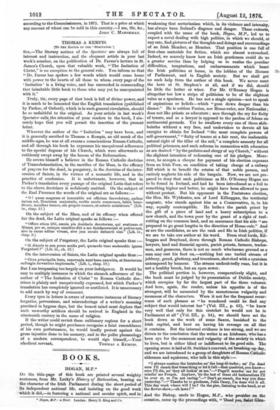THOMAS A ICEMPLS.
[TO THE Emma OF THE "SPECTATOR."] SIR,—The literary notices of the Spectator are always full of
interest and instruction, and the eloquent article in your last week's number, on the publication of Dr. Farrar's lecture in St.
James's Church, upon that valuable work, "The Imitation of Christ," is no exception to the general rule. You inform us that
"Dr. Farrar has spoken a few words which would come home with power to the hearts of all those to whom every page of the 'Imitation' is a living voice, and has succeeded in commending that inimitable little book to those who may yet be unacquainted with it."
Truly, Sir, every page of that book is full of divine power, and it is much to be lamented that the English translation (published by Parker, of Oxford), which is in such general circulation, should be so unfaithful to the original. As your article in last week's Spectator calls the attention of your readers to the book, I sin- cerely hope that you will permit the insertion of the present letter.
Whoever the author of the " Imitation " may have been, and it is generally ascribed to Thomas a Kempis, an old monk of the middle-ages, he was at all events a conscientious Roman Catholic, and all through his book he expresses his unequivocal adherence to the special dogmas of his Church, which were afterwards so ruthlessly swept away by the besom of the Reformation.
He avows himself a believer in the Roman Catholic doctrine of Transubstantiation, in the sacrifice of the Mass, in the efficacy of prayers for the dead, in purgatory, in the doctrine of theinter- cession of Saints, in the virtues of a monastic life, and in the practice of confession. It is unfortunate, however, that in Parker's translation every passage of the original Latin that refers to the above doctrines is sedulously omitted. On the subject of the Real Presence the words of the original are as follows :—
"0! qnam magnum et honorabile est officium Sacerdotum, quibus datum est, Dominum majestatis, verbis sacris consecrare, labiis bane- dicero manibus tenere, ore proprio sumere, et ceteris ministrare." (Lib. iv., chap. 11.)
On the subject of the Mass, and of its efficacy when offered for the dead, the Latin original speaks as follows :—
" Offero etiam tibi, omnia pia desideria devotorum, qui orationes et Misses, pro Be, suisque omnibus dioi a me desidareverunt et petiverunt, sive in came adhue vivant, sive jam seculo defancti tint." (Lib. iv., chap. 9.) On the subject of Purgatory, the Latin original speaks thus :— " Si dixeris to non posse multa pati, quomodo tune sustenebis ignem Purgatorii ?" (Lib. iii., ch. 12.) On the intercession of Saints, the Latin original speaks thus :— " Circa principalia festa, renovanda aunt bona exercitia, et Sanctornm suffragia ferventius imploranda." (Lib. i., chap. 19.)
But I am trespassing too largely on your indulgence. It would be easy to multiply instances in which the staunch adherence of the author of "The Imitation of Christ" to Roman Catholic doc- trines is plainly and unequivocally expressed, but which Parker's translation has completely ignored or mutilated. It is unnecessary to add much by way of comment.
Every tyro in letters is aware of numerous instances of literary forgeries, perversions, and misrenderings of a writer's meaning practised in bygone days, but the honest mind must deplore that
such unworthy artifices should be revived in England in the nineteenth century in the name of religion.
If the writer could revisit these sublunary regions for a short period, though he might perchance recognise a faint resemblance of his own performance, he would loudly protest against the gross injustice done to his memory, and in the polite phraseology of a modem correspondent, he would sign himself,—Your






























 Previous page
Previous page